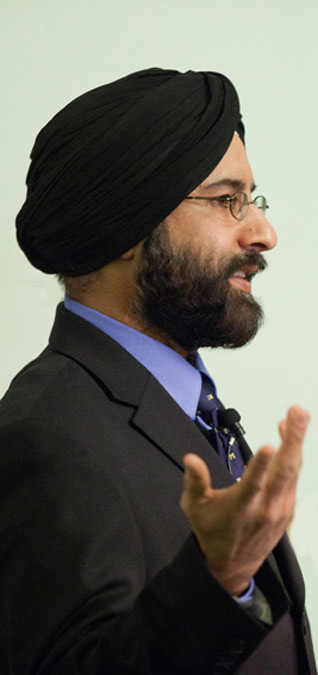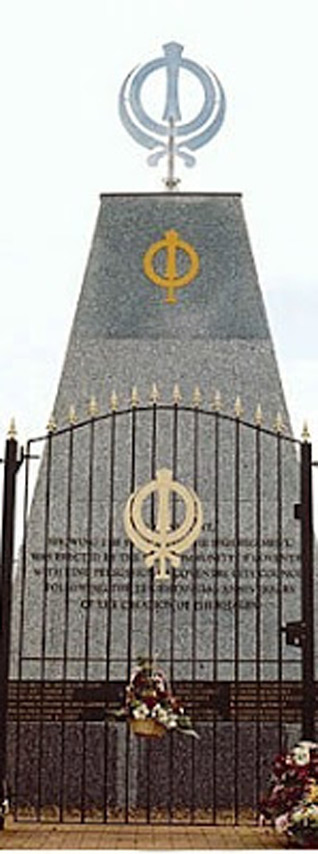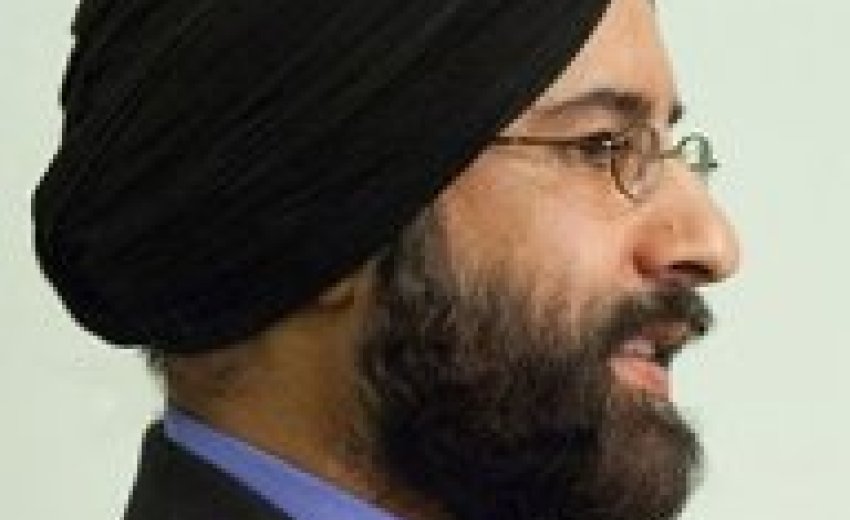 What makes a scholar? And what goes into the making of a Sikh scholar?
What makes a scholar? And what goes into the making of a Sikh scholar?
A new series of articles will explore these very questions by looking closely at the life of one particular Sikh scholar. The subject selected for the purpose of this examination is Arvind-Pal Singh Mandair.
sikhchic.com has, through lengthy interviews with the subject, produced a string of articles which begin with his childhood, span his journey from Punjab to the United Kingdom, and then to the United States, where he now heads a Chair in Sikh Studies.
Arvind represents a new breed which strives to carry the torch of gyan (wisdom), dhyan (contemplation) and vichaar (study) into new areas and greater heights.
We start the series today with a brief bio of our subject in order to introduce our subject, and then, we begin his life-story with his early years that helped shape what was to follow.
Through this exercise, we hope to look at what a scholar does in this day and age … And, how? … Where? … Why?
BRIEF BIOToday, Arvind is an Associate Professor and holder of the Chair in Sikh Studies at the University of Michigan. Prior to his arrival in Michigan, he was the founding Chair of Sikh Studies at Hofstra University, New York.
He holds two doctoral degrees, one in Chemistry and the other in Philosophy and Religion. Though grounded in Sikh and South Asian studies, his research covers a wide range of academic disciplines including comparative and continental philosophy, postcolonial theory and the theoretical study of religion.
He teaches graduate and undergraduate classes in Sikhism, Indian religions, comparative ethics, religion and politics, postcolonial theory and philosophy of religion. He also supervises a number of Ph.D. students who work in different areas of Sikh and South Asian studies.
Arvind is the author and/or editor of several books, including:
- Religion and the Spectre of the West: Sikhism, India, Postcoloniality, and the Politics of Translation
- Sikhism: A Guide for the Perplexed
- Teachings of the Sikh Gurus (with C. Shackle)
- Secularism and Religion-Making
Arvind is the founding co-editor in chief of the journal, Sikh Formations, and serves on the editorial boards of established journals such as Culture and Religion, and Religions of South Asia.
 |
| A memorial in honour of the renowned Sikh Regiment stands in the middle of a traffic island on Stoney Stanton Road at the crosspoint of the North South Road in Coventry. |
I was born in India and came to the UK at age two with my parents in the late 1960’s. They had both been successful teachers in Punjab. My father had been a Headmaster at Khalsa High School near Nawanshahr and my mother was a Headmistress at a Middle School near Mahilpur.
They settled in Coventry which was the hub of the British automotive industry and was booming at the time.
Somehow, I managed to retain hazy memories of Punjab. I spoke fluent Punjabi from an early age. My earliest memories of England are somewhat mixed. I remember not being able to speak English at first, and even in nursery (kindergarten), I stuck with Gurlal, the kid from next door, who also spoke some Punjabi.
I also remember quite vividly that some very nice missionaries from the local parish would regularly drop Biblical literature and other books with Christian stories at our house. We didn’t have any literature around in those days so my mother used these books to help teach me English.
My elementary education was at All Saints Church of England, which was the nearest to my home, and provided a strongly Protestant environment in which I grew up. As I recall, schools such as this one were welcoming to children from Indian backgrounds but not towards Roman Catholic children who were often turned away. Looking back on this, it was probably because they saw us as potential converts to Christianity whereas Catholics presented more of an obstacle. Christian missions were still very active in the 60’s and 70’s.
It never occurred to me at the time but this was my first, albeit unconscious, encounter with the politics of religion – a theme that would come back to haunt me in later life.
After this, I think it was at age 11, I got a scholarship to King Henry VIII School, one of England’s oldest grammar schools, founded in 1545 by a grant from the famous English monarch who was the founder of the Anglican Church.
There were very few Sikhs and Indians at King Henry VIII at that time, and as you can imagine the environment was somewhat stifling and tended to reinforce a Protestant-Secular consciousness that was racist and religious at the same time.
I was never really happy at King Henry VIII. In fact the first 3 years were downright miserable. During the 1970’s and 80’s, cultural racism was routine, particularly towards immigrant children. It was the hey-day of ‘Paki bashing’ in England and like many South Asians my younger brothers and I suffered our fair share of being bashed, both physically and mentally, although my brothers suffered the physical variety more than I did.
In those days there were few gurdwaras in the UK, and certainly they were not in a position to provide resources for educating Sikh children about their tradition.
sikhchic.com: So how did you manage to maintain a link to your heritage tradition?
I would normally say that it was due to my parents who made sure that I knew Punjabi and introduced me to Sikh history while I was in my early teens. But it was actually more complex than that. For one thing, the IWA (Indian Workers Association) was very active in Coventry and I remember my father being loosely associated with them. The IWA membership was mostly Sikh.
They were particularly big on Punjabi poetry recitation and composition which they channelled into their anti-racism politics which kind of diffused into my own sensibility at a young age.
More impactful, though, was the presence of Indian cinema. Some IWA members bought the local Ritz cinema and used it to show Bollywood movies. My dad also had shares in the cinema. In the absence of gurdwaras at the time, the Indian cinema provided some sense of community. For me it helped to reinforce a sense of resistance to being integrated into British culture, which was the norm for South Asians of my generation.
The funny thing, however, was that I was also as British as the next person. So I grew up with a schizoid identity.
A particularly memorable experience, and one that really concretized a sense of resistance within me towards the Protestant-Secular environment, was a return visit to Punjab with my father in the spring of 1973 after a gap of nearly seven years. The timing was fortuitous. There was a massive kar seva going on at the sarovar of the Harmandar Sahib which was being cleaned out, and the Anandpur Sahib Resolution was being drafted and discussed at Anandpur.
I was too young to really understand what was going on, but I could feel the excitement in the air at the time. It sounds a bit clichéd but Punjab provided for me a kind of romantic retreat from the harshness of immigrant life in England during the 70’s and even more so in the early 80’s when Coventry suffered massive unemployment due to the collapse of the automotive industry. It became a center of the skin-head movement which was organized by the far right National Front.
The main targets for the skin heads were South Asians and West Indians. Simply getting home from school was a major problem in those days.
sikhchic.com: Was college any better than school?
Yes, college provided a welcome respite from my schooldays. My initial university education was in the natural sciences. I developed an interest in solid state chemistry and graduated with a First Class Honours in Chemistry, followed by a Ph.D from Aston University, under the supervision of Professor W.R. McWhinnie. Much of this first doctoral thesis was published as a series of papers in journals such as Polyhedron and Inorganica Chimica Acta.
Towards the end of 1988 I went into the chemicals industry and began a period of employment, working for several multinational companies including Laporte Plc (1983 to 1984), Akzo Nobel (1988-1989) and Courtaulds Plc (1989-1991).
The late 1980’s was an interesting period. The years of race-riots in England were followed in the late 1980’s and early 1990’s by the shift towards multiculturalism in UK. Things seemed to be improving for ethnic minorities generally, but as you well know, for Sikhs it was a period of deep crisis and unrest in the wake of the events of June and November 1984 in India.
Egged on by Indian interests, Sikhs were vilified in the mainstream media as terrorists, fundamentalists, etc. No one was immune to public scrutiny. Sections of the Sikh community were embroiled in a conflict with the Indian state, and I remember it being a constant battle to have to correct people’s misrepresentations about Sikhs.
The ongoing crisis affected many of us deeply. The constant refrain in the air was that one needed to do something. But do what? Like many others, my parents become involved in the whole gurdwara scene which was chaotic at the time, with fights breaking out almost every week as one faction fought another for control of community resources. It wasn’t even clear who was fighting who, and for what reason.
At the time, getting involved in the local gurdwara seemed like a good idea. It was seva, we all told ourselves. OK, so a lot of Sikhs did return to the Khalsa fold, but as far as local politics were concerned, things just kept going from went from bad to worse, and many of the born-again Khalsas had a deep suspicion of intellectuals. Anyone who was parrhia likhya (received higher education) was deemed a threat, a closet Marxist, unless s/he could be controlled.
It seemed as if the strings of the Sikh community were always being pulled by some other force, but no one could quite put their finger on what or whom … Of course, later on I think most people recognized that it was a peculiarly Sikh failing – the complete lack of infrastructure that would allow community development, other than within the gurdwara setting.
sikhchic.com: So what was your response to all of this?
I responded in the only way I knew how to … by getting into research as much as possible, not only on the Punjabi crisis, which ultimately led me, round about 1988 (and here I’m kind of condensing several years of activity into a few thoughts), to begin asking questions such as: what is Sikhi? What was it originally? What had it become? And why?
To be fair there were other people who were asking similar questions. Sikhs in America had started the process of creating university chairs in Sikh studies, in the hope of creating a cadre of intellectuals who could provide some answers for those of us still languishing in relative ignorance. But the initial zeal behind the creation of Sikh chairs was overshadowed by the so called ‘McLeod controversy’ which had spread to the UK by 1990.
For me these questions took on an existential urgency that began to consume me. In the late 80’s I joined a regional interfaith network, but soon lost interest …
To be continued …
